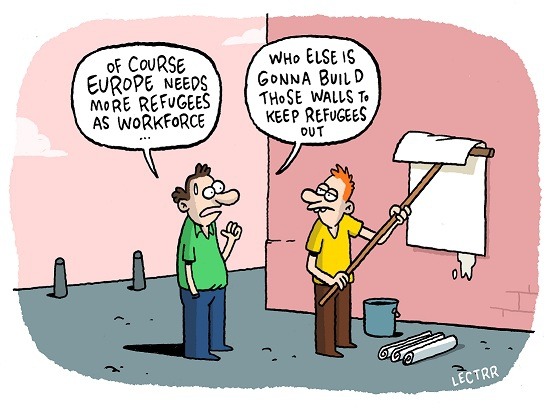Over the past year, Europe has been struggling to cope with refugee arrivals, squabbling over how to share them out and striving to stop more coming. Media coverage this summer may again be dominated by scenes of desperate refugees on Europe’s shores – especially if, as seems likely, the EU’s squalid deal to return refugees to Turkey breaks down. But attention also needs to turn to how best to get refugees into work and contributing more to the economy and society. A ground-breaking new international study that I have written highlights what needs to be done.
Refugees are often seen as a burden. But people admitted for humanitarian reasons also have a lot to contribute economically. Indeed, investing one euro in welcoming refugees can yield nearly two euros in economic benefits within five years. That is a key finding of my study, Refugees Work: A humanitarian investment that yields economic dividends, which was co-published by Open Political Economy Network (OPEN), a new international think-tank that I’ve founded, and the Tent Foundation, whose mission is to help forcibly displaced people worldwide.
Prejudice is a poor predictor of how refugees will fare. When nearly a million Vietnamese “boat people” fled their country in the late 1970s and early 1980s and sought refuge elsewhere, they were typically seen as a burden and often turned away. Eventually, many were allowed to settle in the United States. Most arrived speaking little or no English, with few assets or relevant job skills. Yet refugees from Vietnam are now more likely to be employed, and have higher average incomes, than people born in the US, and they have played a key role in promoting trade and investment links with Vietnam.
Refugees can contribute economically in many ways: as workers of all skill levels, entrepreneurs, innovators, taxpayers, consumers and investors. Their efforts can help create jobs, raise the productivity and wages of local workers, lift capital returns, stimulate international trade and investment and boost innovation, enterprise and growth.
The initial public investment in refugees acts like a fiscal stimulus that boosts economic growth. It tends to be spent on local goods and services, providing a demand dividend that Europe’s depressed economies desperately need.
Once refugees start working, they can provide seven further dividends. Some do dirty, difficult, (relatively) dangerous and dull (4D) jobs that Europeans dislike, such as working in the fields, cleaning offices and caring for the elderly, the area of fastest employment growth in Europe. This 4D dividend enables Europeans to do higher-skilled and better-paid jobs that they prefer.
Higher-skilled refugees (and refugees’ highly skilled children) can fill skills shortages and enhance Europeans’ productivity, thereby providing a deftness dividend. A third of recent refugees in Sweden are college or university graduates; two-thirds of those have skills that match graduate job vacancies. And Syrian nurses can enable Swedish doctors to provide better care to more patients.
Enterprising refugees start businesses that create wealth, employ Europeans, make the economy more dynamic and adaptable and boost international trade and investment. This dynamism dividend can be huge. Sergey Brin, who arrived in the US as a child refugee from the Soviet Union, co-founded Google, America’s second-most valuable company. In Britain, migrants are nearly twice as likely as locals to start a business and in Australia refugees are the most entrepreneurial migrants.
Thanks to their diverse perspectives and experiences, refugees and their children can help spark new ideas and technologies. People who have been uprooted from one culture and exposed to another tend to be more creative and studies show that diverse groups outperform like-minded experts at problem solving. This diversity dividend is substantial too: more than three in four patents generated in 2011 at the top-ten patent-producing US universities had at least one foreign-born inventor behind them. Evidence from Europe shows that diversity boosts both productivity and patenting.
Refugees, who on average tend to be in their early twenties, can also provide a demographic dividend to ageing societies with a shrinking working-age population, such as Germany’s. Dynamic young refugees complement older, more experienced European workers. They can also help pay for the swelling ranks of pensioners. And they support population numbers – and thus investment and growth.
Refugees can also provide a debt dividend. Studies by the Organisation for Economic Co-operation and Development (OECD) show that migrants in general tend to be net contributors to public finances; in Australia refugees become so after 12 years. Better still, the taxes that refugees pay can help service and repay the huge public debts in many EU countries.
Last but not least, refugees provide a development dividend – to themselves, their children and their country of origin. Money sent home to Liberia, a big refugee-sending country, amounts to 18.5% of its annual income.
Refugees have plenty to contribute. But making the most of their capabilities requires good government policies. The US is much more successful than most European countries at getting refugees into work. Indeed, refugees in the US have a higher employment rate than people born in the US. In Europe, they typically have a lower one (except in Italy and Switzerland).
Many EU countries have a lot to learn. Many provide little initial help for refugees while making it hard for them to work. This breeds hardship for refugees and misplaced resentment towards them from locals. Greater investment in refugees combined with reforms to open up opportunities for progress are both economically and politically desirable.
The first priority should be to get asylum seekers and refugees into work quickly. They need the right to work, appropriate skills and job opportunities. Governments should process asylum claims quicker and meanwhile allow asylum seekers to work, as in Sweden. Making it easier to claim asylum from outside the EU and then resettling accepted refugees would give them the right to work as soon as they arrive.
Refugees’ education level and skills should swiftly be assessed to identify language and job training needs and better match them to employment opportunities. The recognition and conversion of foreign qualifications should also be streamlined. Training a refugee doctor to practise in the UK costs £25,000, a tenth of the cost of training a British one from scratch.
Skills aren’t much use without job opportunities. Refugees should be resettled in areas where there are jobs, not those where housing is cheap and employment scarce. Governments should vigorously enforce anti-discrimination laws. Opening up the labour market and making it easier to start a business are crucial. Looking to the future, ensuring refugee children don’t get left behind at school is vital.
Investing in refugees can yield significant dividends for the businesses that employ them and the economy as a whole. They are not a burden to be shared or shirked, but rather an opportunity to be welcomed.
By Philippe Legrain


